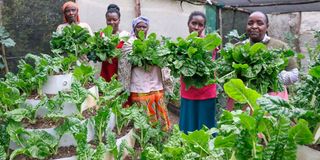How Nakuru's rural women are fighting domestic violence through farming

Belakom Organic Farmers chairperson Beatrice Wangui (right) with some of her colleagues at her vegetable farm in Langalanga, Gilgil Sub-county, Nakuru County.
What you need to know:
- When planting seasons meant domestic violence for Beatrice Wangui and other women farmers in Nakuru, their unplanted fields became visible signs of household turmoil.
- Through a groundbreaking program linking GBV prevention with agricultural training, these women found freedom through community seed banks, 'silent businesses'.
- Now empowered with decision-making power over their farms and finances, they've transformed from victims to community leadersChama.
"Not today! I don't have money for your seeds!" The words still echo in Beatrice Wangui's mind, each planting season bringing back memories of the heated arguments that would erupt in her home between her and her husband. These confrontations would often end with her fleeing, leaving behind an untended farm – a visible testament to the turmoil within her household.
"Everyone in the village could tell when you had fought with your husband," Wangui recalls, her voice softening.
"The bare, unplanted field spoke louder than words, and the rumours were devastating."
Like many women in her community, Wangui would resort to seeking casual labour on other farms, earning as little as Ksh200 (approximately $2) per day.
"Some farm owners wouldn't even pay me, telling me to come back another day. This wouldn't happen to a man," she says, attributing it to what she describes as the 'menacing' aura men possess compared to women's gentler nature.
But 2021 marked a turning point. Through a friend, Wangui learned of a training program on Gender-Based Violence (GBV) targeting local farmers. Together with 16 other women from four villages – Begi, Langa, Konoike, and Mirironi – they formed a group called Belakom – an acronym for the four villages they come from.
"The training opened our eyes," says Wangui, now the group's chairperson.

Belakom Organic Farmers chairperson Beatrice Wangui displays a variety of maize species at her home in Langalanga, Gilgil Sub-county, Nakuru County.
"We learned how domestic disputes directly affect food security. When a woman abandons her farm due to violence at home, her family loses their food source, creating a vicious cycle of hardship."
Jane Njeri, another group member from their quarter-acre farm in Gilgil, Nakuru County, found hope in the program's agricultural training, particularly in hugelkulture techniques. On whether her husband supports her new journey, Njeri says he warmed up to the idea.
"My husband's attitude changed when he saw our two-acre farm's transformation," she says with a smile. "Our arguments have decreased significantly since I started earning from our group's vegetable sales to the market."
The women have developed creative solutions to financial independence.
Wangui speaks of what they playfully call "SB" (silent business) – the practice of saving money from selling small amounts of produce.
"It might just be a bunch of vegetables, too small to notice, but that money helps during emergencies, like when my child needs something from school," she explains proudly."
The group's community seed bank has eliminated their dependence on commercial seeds, allowing them to redirect funds to other household needs.
Mary Nyambura's eyes sparkle as she shares, "Now that we make our own pesticides and save our seeds, we have money left over. Sometimes we can afford meat!" Her statement draws knowing laughter from the group.
Beyond economic empowerment, the training equipped these women with tools to prevent and report GBV cases.
"We can now confidentially report abuse to local authorities (the nyumba kumi chairman or the local chief) without being labelled home wreckers," Wangui explains.
She elaborates on GBV's ripple effect: "A beaten woman can't work her farm. Without food, children go hungry. Hungry children might steal food and get into trouble. One act of violence affects the entire community."

Belakom Organic Farmers members sort seeds from their various cereals in Langalanga, Gilgil Sub-county, Nakuru County.
The group has established clear protocols for addressing domestic violence. "We agreed that if one of us faces GBV, we first approach the couple's parents," Wangui says. "But if the situation is severe, we go directly to the police station."
Dominic Kimani, monitoring and evaluation officer at Seed Savers Network, explains that the project emerged from a startling revelation: women provide 80 per cent of farm labour yet face significant GBV and have limited decision-making power in agricultural matters.
"We discovered women lacked control over both income and factors of production like land in our patriarchal society," Kimani explains.
The project addresses this through a gender transformative approach that focuses on three pillars: prevention and response, leadership, and agroecology.
In three and a half years, it has trained 2,400 farmers across Nakuru and Baringo counties, with women comprising 70 per cent of participants.
The project's focus on agroecology has revolutionised women's farming autonomy.
"Agroecology supports women to have their own farm inputs through seed saving. The women can, therefore, make decisions on what to plant since they have seeds," Kimani notes.
This approach has helped reshape community perspectives on the relationship between gender violence and agricultural productivity. Kimani points to a significant shift in household dynamics: "There was a worrying trend where women would farm, while men would control the bank account hence control the income leaving women with no say. Now, women are engaged in decision making."
"Post-training, women are now in control of income from produce sales, increasing their access to credit," Kimani notes. "They've become trainers themselves, teaching other farmers in the community and acting as agents of change."
A Kenya Institute of Public Policy Research and Analysis report dubbed Ending Violence against Women in Kenya: A Pathway to Achieving Food Security, confirms the significant link between food security and GBV, emphasizing that women's economic empowerment through agricultural programs including training, access to credit, and land ownership rights, is crucial for both violence prevention and food security.
Today, Wangui's farm flourishes, a symbol of her journey from victim to community leader. As the sun sets over her thriving crops, she reflects on the transformation: "Now when people look at my farm, they see strength, not struggle."




